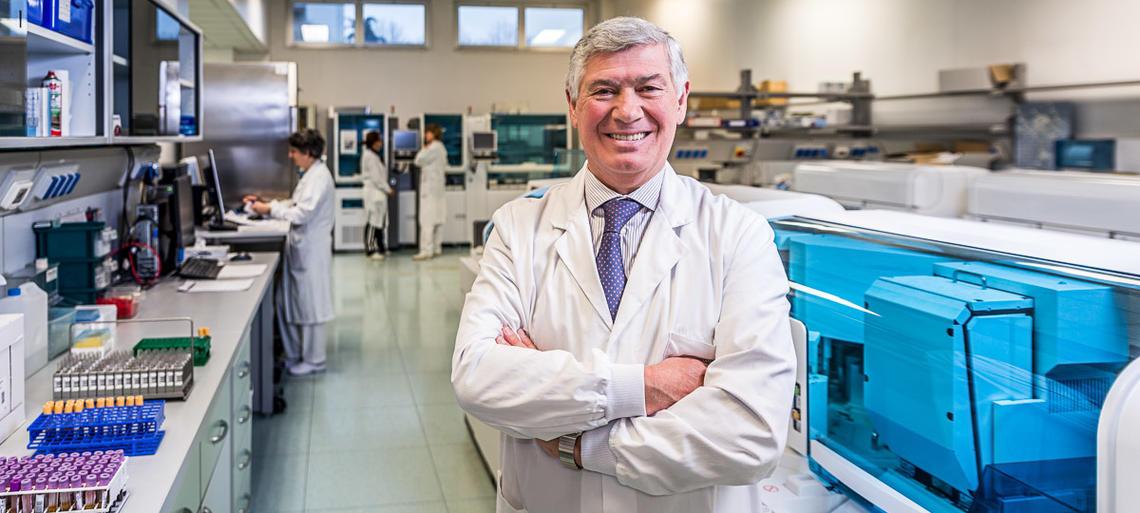
Covid-19 PCR test: how does it work? are there any alternatives?
HOW IS THE CORONAVIRUS INFECTION DIAGNOSED?
The diagnostic tests used to confirm a COVID-19 infection in Lombardy are now performed in several public laboratories and in private ones accredited, authorised and coordinated by the Regional Welfare Authority.
The following test types are presently available to detect the SARS-CoV-2 infection:
- Covid-19 PCR test that highlights the presence of the virus’s genetic material (RNA). It is performed on a nose and throat swab.
- Antigen testing (rapid) that highlights the presence of virus components. It is performed on a nose and throat swab.
- Serological testing (standard or rapid) that highlights the presence of antibodies against the virus. Serological tests are performed on blood samples taken from veins or on capillary blood.
DIFFERENCE OF EXECUTION AND RELIABILITY
The Ministry of Health Memorandum dated 29 September 2020 provides the following classification:
- COVID-19 PCR TEST: At present, this is the most reliable test for diagnosing coronavirus infection. A sample is taken by means of a nose/mouth and throat swab and analysed using real-time RT-PCR (Reverse Transcription-Polymerase Chain Reaction) molecular methods through the amplification of the viral genes that are most expressed during infection. This analysis can be done exclusively in highly specialised laboratories, identified by health authorities. It averagely requires 2 to 6 hours from the time when the sample is sent to be processed in the lab;
- ANTIGEN SWABBING (RAPID): This test type is based on the search for viral proteins (antigens) in respiratory samples. Sampling methods are same as for molecular testing (nose and throat swab) and response time is extremely short (approximately 15 minutes), but sensitivity and specificity of this test seem to be lower than those of the molecular test. This entails the possibility of false negative results if there is a low viral load (tC>25). Also, positive results must be confirmed by means of molecular swabbing. Rapid antigen-test are available in Auxologico Meda and Auxologico Pioltello drive-through swabbing sites.
WHEN RAPID ANTIGEN TESTING IS USEFUL
“Rapid swabbing” has recently been adopted for passenger screening in ports and airports, where it is important to have an answer in a short time.
Even if you take into account false positive results (which is the reason why antigen test positive results must be confirmed by means of a molecular test) and false negative results (given that not only test sensitivity is lower than 100%, but also in consideration of the “window period”, i.e. the period between the time of exposure to the risk and the appearance of positivity), using rapid tests has allowed intercepting a significant number of infected individuals probably with high viral loads, that would not be identified otherwise.
ARE THERE ANY ALTERNATIVES TO SWABBING?
1. ANTIGEN AND MOLECULAR SALIVA TESTS
Recently tests have been offered on the market that are based on analysing saliva samples. Taking a saliva sample is simpler and less invasive than a nose and throat swab, therefore this type of test might prove useful to screen large amounts of people.
Similarly to swabbing, also in the case of saliva testing there exist molecular tests (detecting the presence of viral RNA in the sample) and antigen tests (detecting viral proteins in the sample).
At the moment being, however, the use of saliva testing has not been validated.
As things currently stand, the molecular swab for Covid-19 to search for viral RNA is the only valid test to diagnose COVID-19.
You should also consider the nose and throat swab to search for the antigen, with the observations and limits mentioned above and the need to confirm positivity by means of a molecular test.
2. SEROLOGICAL TESTING
These tests highlight the presence of antibodies against the virus (standard or rapid serological tests). These tests detect that exposure to the virus has occurred; only in some cases, they can detect that an infection is in progress.
At the current state of scientific development, serological testing searching for specific IgM and IgG antibodies cannot replace molecular testing based on viral RNA identification.
Serological testing is useful for the epidemiological evaluation of viral circulation.
The different times with which the various antibody classes appear and develop can be an indicator to confirm whether the infection is present or occurred.
The tests performed in this period are aimed at assessing whether exposure to the virus has occurred and, therefore, are mainly based on searching IgG class only or Total Ig antibodies.
Antibody kinetics resulting from CoV-19 infection is peculiar. Much literature describes situations where not only IgM and IgG antibodies appeared almost at the same time, but also remained present over the time concurrently with the presence of viral RNA at nose and throat level. This means that the immunological results of this diagnostic method cannot be interpreted correctly using standard criteria.
All serological tests should be used and interpreted with caution, keeping in mind that in the case of a negative search, the subject should be considered as “vulnerable” and, in any case, be clinically evaluated in view of ruling out a recently contracted infection.
A positive test result indicates that an infection have occurred, therefore further investigations by swabbing are required.
At Auxologico serological tests provide numerical results expressed on the basis of an antibody concentration index.
READING SEROLOGICAL TEST RESULTS
HOW CAN YOU REQUEST SEROLOGICAL TESTING AND SWABBING?
- A serological test to search for the presence of antibodies can be requested by all self-paying individuals. At Auxologico a serological test costs 40 Euros and can be taken after on-line booking.
If you are positive, you will be contacted to be swabbed. In this case, the swab is taken at the charge of the Regional Health Service, i.e. free of charge for the patient. - At Auxologico the Covid-19 PCR test costs 90 Euros and can be taken after on-line booking.
